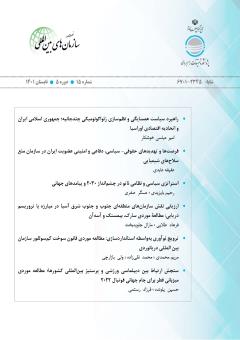راهبرد سیاست همسایگی و نظمسازی ژئواکونومیکی چندجانبه؛ جمهوری اسلامی ایران و اتحادیه اقتصادی اوراسیا
محورهای موضوعی : Politics
1 - دانشآموخته دکترای روابط بینالملل دانشگاه تهران، تهران، ایران
کلید واژه: اتحادیه اقتصادی اوراسیا, سیاست همسایگی, دیپلماسی اقتصادی, چندجانبه گرایی اقتصادی, نظمسازی ژئواکونومیکی, توسعه صادرات, آسیای مرکزی و قفقاز,
چکیده مقاله :
نظمسازی ژئواکونومیکی بهعنوان یکی از پایههای اصلی نظمسازی راهبردی در سطح منطقه غرب آسیا و ایفای نقش ثباتسازی اقتصادی در مناطق پیرامونی به یکی از جهتگیریهای اصلی سیاست خارجی منطقهای جمهوری اسلامی ایران تبدیل شده است. سیاست همسایگی بر مبنای دیپلماسی اقتصادی در خوشه ژئواکونومیکی آسیای مرکزی و قفقاز فضای تنفس تجاری مناسبی را در قالب عضویت در اتحادیه اقتصادی اوراسیا فراهم ساخته است. صادرات کالاها و خدمات مصرفی و سرمایهای به این منطقه جهت تقویت صادرات و ارزآوری از جمله اهداف پیوستن به اتحادیه مذکور هستند. سؤال پژوهش حاضر این بوده که «فرصتها و چالشهای پیش روی عضویت ایران در اتحادیه اقتصادی اوراسیا جهت تأثیرگذاری و مشارکت ژئواکونومیکی در آسیای مرکزی و قفقاز چیست؟» و این فرضیه در پاسخ مطرح شده است که فرصت گسترش بازارهای صادراتی و تقویت همگرایی ژئوانرژی با اعضای اتحادیه مهمترین فرصتها و عدم مکمل بودن اقتصادهای اعضا و وجود رقابت در صادرات انرژی از جمله چالشهای پیش روی جمهوری اسلامی ایران در بازارهای اتحادیه اقتصادی اوراسیا است. روش پژوهش در مقاله حاضر توصیفی- تبیینی بوده است.
Geoeconomic Order Making as one of the main foundations of strategic Order Making in West Asia as well as playing the role of economic stabilization in the periphery areas have become some of the main directions of regional foreign policy of the Islamic Republic of Iran. Neighborhood policy based on economic diplomacy in the geo-economic cluster of Central Asia and the Caucasus has provided a favorable business environment in the form of membership in the Eurasian Economic Union. Selling of consumer goods and services to the region in order to boost exports and enhance the value of national currency are among the main goals of joining the union. The question of the present study is that “what are the opportunities and challenges of advancing Iran's membership in the Eurasian Economic Union regarding geoeconomic participation in Central Asia and the Caucasus? In response to the above question, it is hypothesized that the expanding export markets and strengthen the convergence of geoenergy with union members are the most important opportunities and incompatibility of the economies of the member states along with their competition in energy exports are among the challenges facing the Islamic Republic of Iran in the markets of Eurasian Economic union. The research method in this article is descriptive-explanatory.
